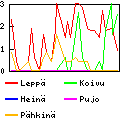Just for Fun
Käännös: [ Google ]
Kategoriat: [ ATK ]
This is the follow-up to the previous episode.
Today's discussion with Ville was concluded more or less like that: he claimed that having access to the source code is of no use for him although he can code, because he has never been able to gather the necessary energy to start hacking an existing software. Well, that's his problem, isn't it? I devote some of my free time to hack software (in a very insignificant way, I'm sure) to adapt it to my needs, he devotes his to something else. And I enjoy my small software hacks. I'm proud of myself when I manage to understand MPlayer's subtitles code and add support for DVB subtitles, or when I add support for X11's screensaver protocol to perl's X11::Protocol module. And let's be honest: LATEX is ridiculously complicated, but I enjoy fighting the beast and bending it to my will.
I have loads of fun doing things myself. I make my own pizzas from scratch (dough and tomato sauce, altough I don't grow the tomatoes, olives and wheat, nor do I breed pigs or milk cows), I make my own ice-cream, my own Home Theater PC, my own blog engine, my own Carcassonne meeples. Buying something ready-made feels like a waste of money if I can do it myself for a reasonnable cost in time. I'm not going to devote large amounts of time on large projects such as writing my own operating sytem, word processor or image manipulation software, mainly because the time it would cost me compared to the benefit I would get out of it compared to using the existing tools is not worth it. Hacking oversized projects don't really interest me, even if they have bugs and I'd like to fix them. But I very much appreciate that small, one-person -sized softwares are free for me to hack when I set my mind to it.
The ones who consider the freedom given by free software to be useless are the ones who are too busy/lazy to take advantage of it and have more money at hand than time.
[ Postattu 22. lokakuuta 2008 klo 23.41 | 9 kommenttia | kestävä linkki ]






